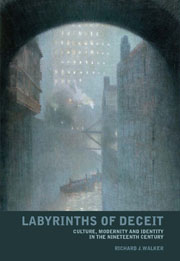Book contents
- Frontmatter
- Contents
- Acknowledgements
- Introduction: Tracing the fragments of modernity
- Part I (De)Generating doubles: duality and the split personality in the prose writing of James Hogg, Robert Louis Stevenson and Oscar Wilde
- Part II The stripping of the halo: religion and identity in the poetry of Alfred Tennyson, James ‘B. V.’ Thomson and Gerard Manley Hopkins
- Introduction
- 4 A life of death: Alfred Tennyson's ‘St Simeon Stylites’
- 5 But what am I? Alfred Tennyson's In Memoriam
- 6 All is vanity and nothingness: James ‘B. V.’ Thomson's haunted city
- 7 Dead letters: Gerard Manley Hopkins's ‘Terrible Sonnets’
- Part III Infected ecstasy: addiction and modernity in the work of Thomas De Quincey, Alfred Tennyson, Christina Rossetti and Bram Stoker
- Conclusion: Ghost-script
- Notes
- Bibliography
- Index
Introduction
from Part II - The stripping of the halo: religion and identity in the poetry of Alfred Tennyson, James ‘B. V.’ Thomson and Gerard Manley Hopkins
- Frontmatter
- Contents
- Acknowledgements
- Introduction: Tracing the fragments of modernity
- Part I (De)Generating doubles: duality and the split personality in the prose writing of James Hogg, Robert Louis Stevenson and Oscar Wilde
- Part II The stripping of the halo: religion and identity in the poetry of Alfred Tennyson, James ‘B. V.’ Thomson and Gerard Manley Hopkins
- Introduction
- 4 A life of death: Alfred Tennyson's ‘St Simeon Stylites’
- 5 But what am I? Alfred Tennyson's In Memoriam
- 6 All is vanity and nothingness: James ‘B. V.’ Thomson's haunted city
- 7 Dead letters: Gerard Manley Hopkins's ‘Terrible Sonnets’
- Part III Infected ecstasy: addiction and modernity in the work of Thomas De Quincey, Alfred Tennyson, Christina Rossetti and Bram Stoker
- Conclusion: Ghost-script
- Notes
- Bibliography
- Index
Summary
The bourgeoisie, wherever it has got the upper hand … has drowned the most heavenly ecstasies of religious fervour, of chivalrous enthusiasm, of philistine sentimentalism, in the icy water of egotistical calculation.
Between the buildings assigned to each sex was a third row of buildings, containing the administration, accommodation for the superintendent and staff, and that critical part of every well-wrought Victorian asylum, the chapel, in which the inmates could be brought the consolations of organized religion.
In 1810 William Black, London physician and author of Dissertation on Insanity published in the same year, tabulated the causes of admission for approximately one third of the patients entered at Bethlem public madhouse. Bethlem, or Bedlam – the popular nomenclature used by Black and a term synonymous with insanity – had originally been founded by the Order of St Mary of Bethlehem in 1247; used for the habilitation of lunatics from 1377 onwards, the hospital had stood at Moorfields in London from 1676. In his table Black listed ‘Religion and Methodism’ as the most popular cause of insanity after ‘Disappointments, Grief’, ‘Family and Heredity’ and ‘Fevers’. Ninety patients were diagnosed as apparently demonstrating the symptoms of religious mania, accounting for just under a tenth of those studied. Black's identification of religion as constituting a significant cause for insanity or derangement is hardly surprising; madness and Christianity seem to have been intertwined from the latter's earliest days.
- Type
- Chapter
- Information
- Labyrinths of DeceitCulture, Modernity and Identity in the Nineteenth Century, pp. 119 - 123Publisher: Liverpool University PressPrint publication year: 2008

